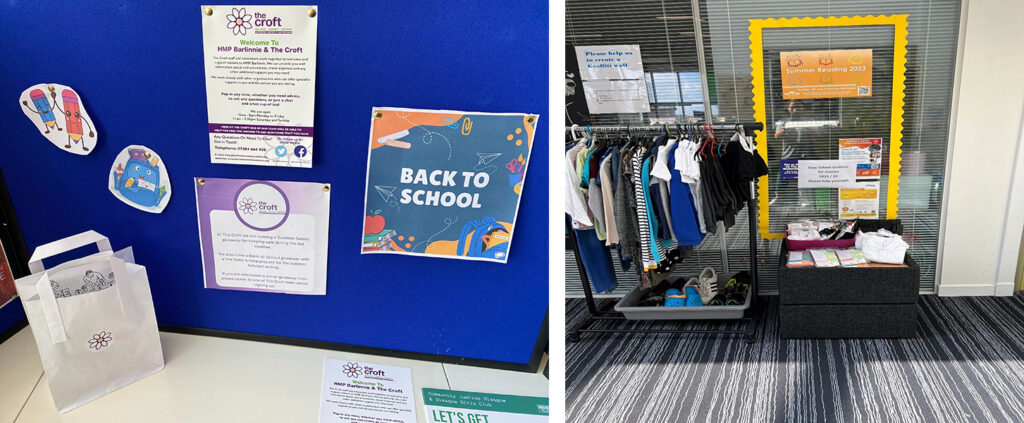Millie Mann on the challenges faced by families who are separated by imprisonment now that the schools are back
Although it can be an exciting time for many children and young people as they reunite with friends or start a new chapter, going back to school can also be the cause of more complicated emotions. This can be heightened for children affected by imprisonment.
A lot can change during the school holidays – including the imprisonment of a family member. An estimated 20-27,000 children experience a parent’s imprisonment each year in Scotland – twice as many as will experience a parent’s divorce in that time. Teachers or other professionals working with children or young people may not always be informed of these changes, but it is important to be sensitive to the possibility.
A family member’s imprisonment can be a time of massive upheaval for children and young people, particularly when a parent goes to prison. Only 5% of children stay in their family home after a mother’s imprisonment – and only a small portion are looked after by their dads. This – often sudden – change in living arrangements and the uncertainty that comes with it can have a significant impact on a child’s mood, behaviour, or ability to concentrate in class.
The imprisonment of a household member is one of the ten adverse childhood experiences (ACEs), known to have a significant impact on children and young people’s long-term health and wellbeing. Not only this, children with a family member in prison are five times more likely to be exposed to other ACEs.
People in prison often come from the most deprived areas in Scotland. The financial impact of imprisonment is significant for many families supporting a loved one in prison, but particularly for families already living in poverty. Many spend around a third of their monthly income supporting a family member in prison, and costs are even higher for families supporting someone on remand (around half their monthly income). The cost of new uniforms, school supplies, lunches and activities can put a considerable strain on many families’ finances.
This financial strain is often compounded by the emotional impact of imprisonment. Children affected by imprisonment may be more likely to experience stigma at school and can become a target for bullying. Many children may also be missing their loved one in prison, particularly when it feels like they are absent for important milestones in their life like their first day of school. Children have a right to maintain contact with a loved one in prison and maintaining meaningful family connections, where appropriate, can improve the health and wellbeing of all involved.
Children should not have to face this alone – support is available. Families Outside provide year-round support to children and families through our helpline and one-to-one support, as well as training for professionals who may work with them.
Prison Visitors’ Centres can also be a vital support for children going back to school. Many Visitors’ Centres, such as The Croft at HMP Barlinnie and Action for Children at HMP Grampian (main image), host back to school events where families are provided with access to free school uniform as well as school supplies and stationery. This year the HMP Low Moss Visitors’ Centre, run by Early Years Scotland, also had a back to school photo opportunity for children to take pictures with their loved one in prison wearing their school uniform with a backdrop of a banner and balloons. There was also a chalkboard that children could personalise with their name and school to include in the photograph. One copy of the photograph was given to the person in prison, and another was sent home to their families.
The Cyrenians Visitors’ Centre at HMP Addiewell even hosts a homework club within the prison, where children can do their homework with their family member in prison now that they have gone back to school. Tess Hamilton, the manager of the Cyrenians Visitors’ Centre, describes how one family has found these sessions particularly helpful:
‘Over the school holidays, Dad has been putting together some worksheets for his child to complete during these sessions. Since the return to school, Mum and Dad have both been supported by Visitors’ Centre staff during Homework Club with the understanding of the levels of homework the child now receives from school. They are also being supported to have a better understanding of the child’s dyscalculia and the support available for this.’

There are also lots of resources that can be used to better support children affected by imprisonment. The Prison Reform Trust’s Child Impact Assessment Toolkit, developed alongside children and young people with lived experience, provides a framework for professionals to work through to ensure children’s voices are heard and that they get the support they need at the earliest opportunity.
Children cannot be properly supported if they are experiencing issues that go unnoticed. It is important to be aware of these issues and how to effectively support or signpost someone if needed. And, as we can see, there are some great services out there with lots of support to offer!
Families Outside’s CPD accredited training is available to anyone working with children and young people or families. Check out our training page on our website – or email us at [email protected] – to find out about upcoming opportunities or to discuss any bespoke training enquiries.
Millie Mann is communications officer for Families Outside.
Families Outside is the only national charity in Scotland working solely on behalf of families affected by imprisonment. For support or information, or to find out more, visit the Families Outside website.







